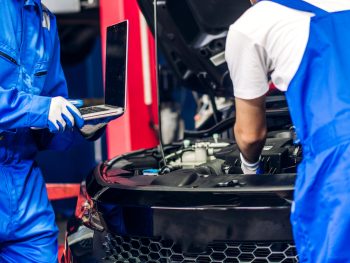‘Dangerous’ shortfall in ADAS-qualified technicians could risk road safety
A current dangerous shortfall in technicians qualified to work on vehicles with ADAS could present a real road safety risk, according to the Institute of the Motor Industry (IMI).

The IMI is calling on all stakeholders, including the Government, to work together on futureproofing the technician workforce
At least one in 10 cars on UK roads will feature Level 2 autonomy by the end of 2023, growing to almost half of the car parc by 2030, according to estimates by the industry body.
But new data from the IMI finds there are currently only around 3,500 ADAS-qualified technicians in the UK, leaving a void right now of some 18,000 technicians to meet the current ADAS requirement.
Steve Nash, CEO of the IMI, has said that “all the noise about EV could well have distracted the sector – and government – from this more urgent and immediate need”.
“Adapting a workforce to meet the rapidly evolving needs of an increasingly advanced car parc is no mean feat and certainly there has been plenty of focus on getting ready for EV,” he commented. “However, at the IMI we fear this could actually mean the sector has taken its eye off the ball in relation to upskilling for ADAS. This technology is already present in vehicles on UK roads. But with only 3,500 technicians ADAS-qualified there’s a real risk that repairs and recalibration is taking place without the proper skills – and that is a serious risk to road safety.”
The IMI is now warning of a postcode lottery when it comes to finding a qualified technician. And it says motorists may resort to using garages that do not have the right equipment or qualified technicians to repair and recalibrate Advanced Driver Assistance Systems properly, with potentially dangerous consequences.
ADAS technology focuses on increasing safety and convenience, without taking full control away from the driver. Systems such as lane assist, adaptive cruise control and self-parking allow the vehicle to control steering, acceleration and braking.
But problems with the electronics, sensors and software within these vital systems could lead to serious safety breaches or even collisions, which could be highly dangerous at speed on a motorway. And the IMI says proper maintenance and regular servicing are essential to keep drivers and other road users safe.
The increased use of Advanced Driver Assistance Systems (ADAS) is also a vital part of the journey towards fully autonomous vehicles which should make roads safer. However, if such complex technology is not supported correctly by a technician with the relevant and up to date training, it could instead lead to catastrophic collisions.
The IMI is now calling for all those involved, including the Government, to work together on futureproofing the technician workforce.
“Maintaining modern, high-tech vehicles is a matter of life and death, so a shortage of suitably trained technicians is nothing short of a crisis, particularly when you consider the Government’s stated ambitions for autonomous vehicles.” concluded Nash. “It is imperative, therefore, that all relevant stakeholders – including government – acknowledge the profound economic and road safety repercussions of the prevailing skills gap. We need to work collaboratively to see more technicians gain the necessary qualifications to protect the industry and road users as we move towards an exciting future of autonomous driving.”
ADAS-qualified techniciansThe Institute of the Motor Industry (IMI)












